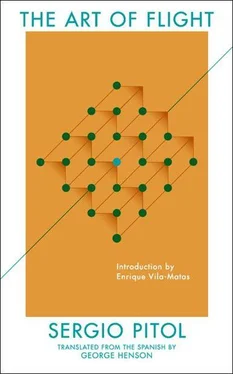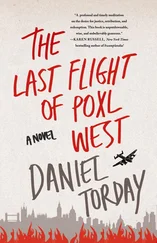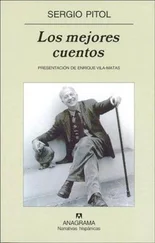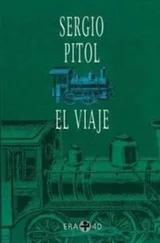Federico gives me new instructions: walk slowly until you arrive to the hotel, breathe deeply, and be careful when crossing the street.
“If when you arrive to your hotel,” he says, as we say goodbye, “you feel bad, call me. If tonight, no matter what time, you feel bad, don’t hesitate to call me at home. You can count on our help at any moment.”
I went out into the street. Still stunned, I began to walk slowly. The walk from Federico’s house to my hotel normally takes a half hour at a relaxed pace. I was sure that the walk would exceed my energy. I thought about walking three or four blocks and then taking a taxi. All I wanted to do was lie down, take a sedative, and forget about the hypnosis, its revelations, and its results. I kept walking, and with each step I felt, almost physically, that a wound my body had harbored secretly for more than fifty years was beginning to heal. As I progressed, I could feel the improvement. The only thing I was conscious of was that I was leaving an illness behind me. I began to realize that I had lived all those years just to prevent that monstrous pain from repeating itself, to block the circumstances that might provoke it. My life’s meaning had consisted of protecting myself, fleeing, wrapping myself in armor. Suddenly I noticed on the sidewalk ahead a bougainvillea that was climbing a tree and flowering in its branches. It looked like a marvelous spectacle unlike anything I had seen before. My fatigue disappeared as if by magic. When I arrived at the hotel, everything had bloomed. I went directly to the restaurant, I ate like a barbarian, everything tasted exquisite; I arrived to my room, lay down on the bed, and began to read an interview with Cioran. I jotted down in my notebook: “We’re a terrible mixture, and in each individual coexist three, four, five different individuals, so it’s normal that they don’t agree with each other”; it wasn’t relevant, but it soothed me; and with that news I fell asleep.
The next morning I awoke with an unfamiliar feeling, as if my dialogue with myself were different. Many things had become coherent and explainable: everything in my life had been nothing more than a perpetual flight. There had been fantastic experiences, yes, extraordinary, which I could never regret, but they had also been a nucleus of agony that demanded that I close them off and look for new ones.
My debt of gratitude to Doctor Federico Pérez del Castillo, who allowed me to understand this, is infinite.
Xalapa, August 1994
For Laura Molina Montmany
I must confess that I am deaf in my left ear, which produces in me mood changes that, at their worst, could be confused with idiocy and also dementia. If at a social gathering, especially a dinner, the guest to my left is by nature very talkative, I’m already lost. I say the wrong thing, instinctively, by chance; imprecisions and nonsense abound, until the failed interlocutor slowly moves away, tired of repeating his questions and of hearing answers that have little or nothing to do with the questions. This is the source of incredible inhibition for me, and once inhibited, tense and fearful, I’m no longer responsible for my behavior.
In the spring of 1993 I took a brief trip to Europe to celebrate my sixtieth birthday. I chose three cities that were foundational in my life: London, Rome, and Barcelona. Warsaw was missing. I wanted to be in Rome at the same time as Augusto Monterroso and Bárbara Jacobs at the presentation of the Juan Rulfo Prize for Latin American and Caribbean Literature, which was being presented to Monterroso. I wrote to Lia Ongno, who at that time was finishing a translation of one of my novels, to let her know that I would be in Rome the day of the award, certain that she, as translator of the honoree, would be present, and that way we could meet and find time to resolve some questions regarding the text about which she had written me. Lia, on her end, informed Antonio Melis, head of the Faculty of Letters at the University of Siena, an old friend of mine, about my upcoming trip to Italy, who, in turn, sent me a fax, inviting me to give a lecture in his department, where, I should add, the chair of Portuguese Studies is held by Antonio Tabucchi, the person who introduced Pessoa to Italy, his translator and commentator, and, most importantly, an exceptional novelist.
I visited Siena briefly at the beginning of 1962, having spent the December holidays with my mother’s family. Christmas in Bologna and New Year’s Eve in Bonizzo castle. At the end of the last century, my great-grandfather Domenico Buganza crossed the ocean with his three daughters, Preseide, Agnese, and Catarina, the youngest, who was my grandmother, to educate them in Italy. Only two returned: my grandmother and her sister Agnese. The other, the oldest, married in Italy, and has since then lived in that castle, from which she has scarcely moved during her very long life.
Two or three days before my arrival, they gave my tía Preseide calming infusions to soothe her nerves, in preparation for her great-nephew’s surprise visit from Veracruz. When I introduced myself, she stood up and threw herself into my arms with the force of a hurricane, only to make me repeat again and again the important events from the family history that had happened on the other side of the Atlantic during her sixty-year absence. Except during the war years, correspondence between her and my grandmother had never been interrupted. Still she wanted to hear firsthand everything she had read over the years. She asked me about ranches, towns, people whom I’d never heard mentioned; I answered as best I could, which is to say clumsily. Suddenly she looked at me with contempt; she must have thought that she had before her an impostor who was pretending to be, who knows to what ends, the grandson of Catarina Buganza-Buganza, her youngest sister. At times she’d grow tired and would send me to the garden or to see the collection of Etruscan pieces that belonged to her granddaughter’s husband, on display in another part of the castle, or she’d ask her son-in-law, Noradino, a mathematician and tía Argia’s husband, to take me to see the surroundings, the river banks where my aunts and grandmother had strolled so many times at the beginning of the century. The truth is that apart from the snow there was little or nothing to see except a thick, milky white mist that obscured everything. I can remember, while almost half-asleep, taking a pair of car trips, one to Ostiglia, a small city, plunged into darkness and the closest to the castle, that according to my uncle had been, during some period, I do not remember which, the outer limit of the Roman empire; the other, to a small architectural jewel — or did it just seem that it was because I was able to see churches and palaces that were not covered in fog? — Mirandola, whose most illustrious son was none other than Pico della Mirandola. I spent those days enveloped by a very intense emotion. I sensed in those settings the presence of my grandmother; my grandmother the child, my grandmother the adolescent, my grandmother on the eve of returning to Mexico. I wrote her a letter from Ostiglia relating my reunion with the family, the conversations with tía Preseide, of which she, my grandmother, was the primary topic of conversation; I comforted her, reassured her that I was on my best behavior, drinking moderately, minding what I said. I told her about the condition of the property; a section was heavily damaged, but for years they had stored the materials needed to begin the work behind the garden in large sheds: tons of old Saracen bricks, acquired primarily in Calabria and Sicily from ancient buildings now in ruins, all to be used for the restoration.
Читать дальше












